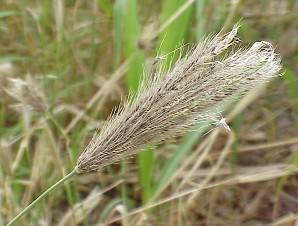Scientific name: Chloris virgata Swartz
Synonyms: Chloris gabrielae Domin; Chloris decora Nees ex Steudel; Chloris barbata Swartz var. decora (Nees ex Steudel) Benth.Common name: Feathertop Rhodes grassFamily: PoaceaeOrigin:Cosmopolitan plant. Habit:An annual grass, growing to 1 m tall, with upright or decumbent (ie. lying on the ground but with upright tips) stems. Habitat:A weed of roadsides, footpaths, railways, disturbed sites and cultivation. General description:Stems and leavesThe stems (culms) are often bent at the joints and adventitious rooting may occur where these joints are close to the ground. Leaf blades are linear (5-25 x 0.3-0.6 cm in size) and hairless (glabrous) or sometimes with a few hairs (sparsely pubescent). The ligule is a flattened membrane about 0.5-1 mm long with small hairs (cilia) on top and larger hairs at the edges. Flowers and fruitThe inflorescence is a digitate or sub-digitate arrangement of 7-19 spikes each about 3-9 cm long. The spikes are upright, stiff, adjacent to each other and with a whitish or greyish tinge. Each spike has a large number of spikelets that contain two florets. Each spikelet has two small and thin awns that are 5-10 mm in length as well being topped with hairs. Distinguishing characteristics:A short-lived grass with distinctive feathery digitate or sub-digitate inflorescences made up of many spikes. Chloris virgata (feathertop Rhodes grass) is closely related and similar to Chloris gayana (Rhodes grass). However, this grass has loose spikes that are borne in a less upright position. It's spikelets also have smaller awns (ie. less than 5 mm long) and three or four florets. Noxious status:Not noxious. Sources:Stanley, T.E. and Ross, E.M. (1983-1989). Flora of South-eastern Queensland. Volume 3. Department of Primary Industries, Brisbane. |
Brisbane
St Lucia, QLD 4072
+61 7 3365 1111
© 2009 The University of Queensland


